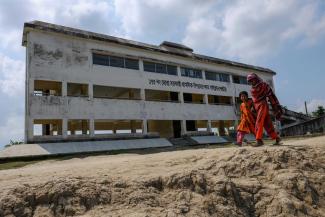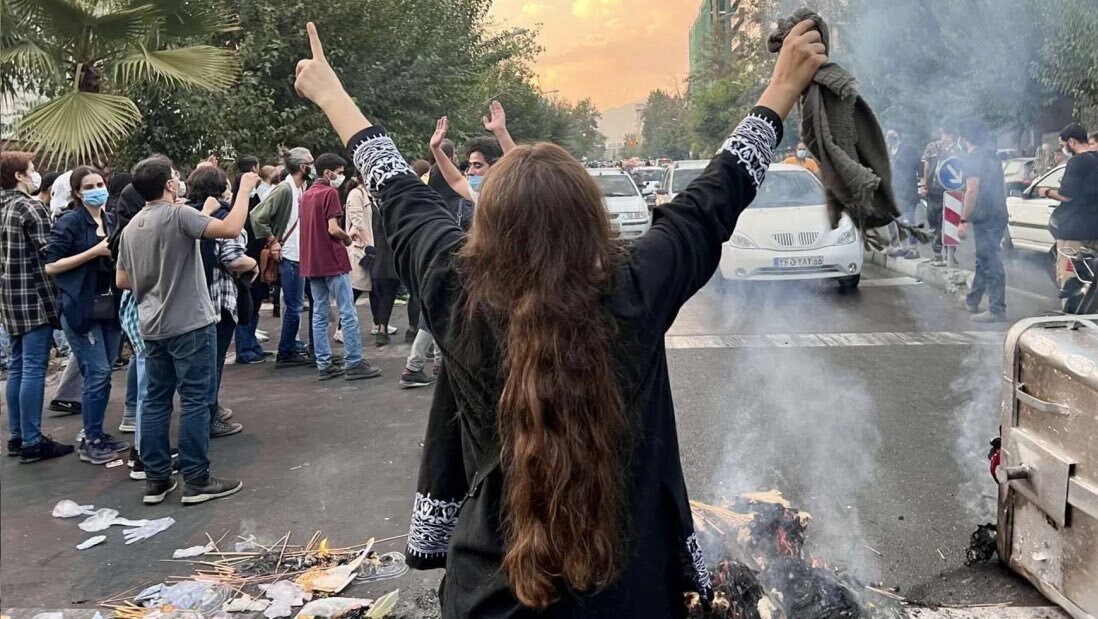Disaster preparedness
Boosting disaster preparedness in the Ganges Delta

Due to its geographic location and high population density, the entire country is a climate hotspot. Common issues include heat waves, erratic rainfall, flooding, droughts, cyclones, river bank erosion and ground water becoming saline due to the rising sea level. People who live close to river banks or the Indian Ocean Coast are especially at risk.
The nation must cope with both slow- and rapid-onset crises. Climate change is affecting water availability, food security, nutrition, health and livelihoods in general. Loss of land or a failed harvest often push people below the poverty line. The results are displacement and social crisis.
Impressive progress
The good news is that impressive progress is being made. The death count of major cyclones has gone down spectacularly. In 2020, Amphan claimed 26 lives. In 1991, Gorki was of similar magnitude, but killed almost 140,000 people. Another two decades earlier, the death toll of Bhola was even worse: more than 500,000 dead.
These numbers show that the action taken by both government agencies and civil-society organisations has been successful. Today, Bangladesh has an effective early-warning system. Among other things, it relies on cell-broadcasting. Before an imminent catastrophe, text messages are sent to every mobile phone in the area concerned. Volunteers have been trained to manage evacuation efforts, with an eye to supporting needy people in particular. The coastal areas have an extensive network of cyclone shelters, and many of them serve other purposes too. Some, for example, are primary schools in ordinary times, for instance.
Preparing for disasters obviously includes teaching school children what to do when a cyclone strikes. It has become part of the national curriculum. When the need arises, the shelters can accommodate entire village populations. Indeed, most people flee there when disaster strikes, though some of those who do not, still perish.
Civil-society organisations matter very much
The role of non-governmental organisations cannot be over-emphasised. Bangladesh has a vast network of them, and many are involved in raising awareness of climate change and its impacts, disseminating knowledge among local communities and building capacities to tackle socio-economic hazards.
In this brief essay, the example of the Bangladesh Red Crescent Society must suffice. After the deadly devastation of Bhola in 1970 and the war of independence in 1971, it established its Cyclone Preparedness Program (CPP) in 1972. Today, it has 70,000 volunteers who, in a unique institutional arrangement, serve communities at the grassroots level.
Cyclones, of course, do not only harm human bodies. They cause economic devastation which is harder to limit. Homes are destroyed, livestock killed and fields made useless. It adds to the problems that many families who depend on small farms or fishing are too poor to afford private insurance. The assets they lose – a boat, a cow or artisanal tools, for instance – may not be worth a lot of money, but to the people concerned, they are most precious. Their livelihoods depend on them.
For people to bounce back after a disaster, several things are helpful, they include reliable social safety nets and infrastructure that is strong enough to survive extreme weather. Economic opportunities matter too. In all areas, nature-based solutions are best because they are not only comparatively inexpensive, but also enhance, rather than deplete the resilience of the local eco-system. The rehabilitation of mangrove forest along the coast, moreover, has reduced the impact a cyclone has after landfall, with the trees serving as a first barrier. Moreover, locally-led interventions are to be preferred, because they tend to be both efficient and effective (regarding nature-based and locally-led solutions, also see David Mfitumukiza on www.dandc.eu).
In recent decades, Bangladesh has adopted several policies, plans and strategies for coping with climate change. Important ones include:
- the National Adaptation Programme of Action of 2005 (NAPA), which was updated in 2009,
- the Bangladesh Climate Change Strategy and Action Plan (BCCSAP) of 2009,
- the Standing Orders on Disasters (SOD) of 2010, which were updated in 2019,
- the Climate Change and Gender Action Plan (ccGAP) of 2013;
- the National Disaster Management Policy of 2015 , and
- the National Disaster Management Plan for the years 2021 to 2025,
- Eighth Five Year Plan 2020-2025
- Bangladesh Delta Plan 2100 of 2018,
- the Mujib Climate Prosperity Plan (MCPP) of 2021.
In the context of the UN Framework Convention on Climate Change, moreover, the Government of Bangladesh has prepared a national adaptation plan and spelled out the nationally determined contributions to multilateral climate action.
Comprehensive vision
The focus of policymaking has been expanded from initially identifying and tackling problems of an immediate nature to increasingly holistic approaches that boost the resilience of individual people, local communities and ultimately society as a whole. The vision is to eradicate poverty and achieve economic and social well-being. The Government of Bangladesh’s idea of climate resilience is both pro-poor and gender-sensitive. It keeps updating its policies in the light of new evidence and insights.
So far, two national ministries play lead roles. They are the Ministry of Environment, Forest and Climate Change and the Ministry of Disaster Management and Relief. Other ministries, however, are expected to design their own programmes in accordance with the overarching policies. Subnational government institutions matter too, of course, including district administrations and municipal authorities. All ministries are expected to prepare their own detailed work plan in accordance with the SOD guidelines. Moreover, there are Disaster Management Committees (DMC) at all subnational levels.
In terms of implementation, Bangladesh has been relying on its own financial resources to a large extent. The Bangladesh Climate Change Trust Fund (BCCTF) was established in 2010. The national government uses it to distribute funding. So far, the BCCTF has disbursed the equivalent of about $ 450 million.
Most of the related projects have focused on things like water infrastructure, food security and disaster risk reduction. Apart from multi-purpose shelters, other kinds of built infrastructure are helpful, including for example drainage and irrigation channels. River regulation and hydraulic systems matter too, and strong embankments protect people and fields from flooding. In a more general sense, agricultural adaptation, afforestation and reforestation help to reduce disasters risks too.
International funding
The country has also received financial resources from abroad in past decades. Official development assistance (ODA) and various forms of climate finance has helped Bangladesh to gradually turn vulnerability into resilience. It is disappointing, however, that high-income countries have not been living up to all climate-finance commitments (see Saleemul Huq on www.dandc.eu).
Although Bangladesh has come a long way in achieving resilience, there is still room for improvement. According to the most recent assessment report of the Intergovernmental Panel on Climate Change (see Roli Mahajan on www.dandc.eu), one of the problems Bangladesh will most likely face is even more frequent and more intense cyclones in the future.
The IPCC has also mentioned maladaptation to environmental change as a serious challenge. In Bangladesh, shrimp cultivation is an example. Converting agricultural land to aquaculture ponds brought short-term benefits, but the long-term impacts have proven to outweigh them. The business is now seen to be unsustainable. Future development plans must be better geared to eco-friendly, but broad based prosperity.
Link
Md Bodrud-Doza works for the International Centre for Climate Change and Development (ICCCAD) at Independent University, Bangladesh (IUB).
bodruddoza.env12@gmail.com












